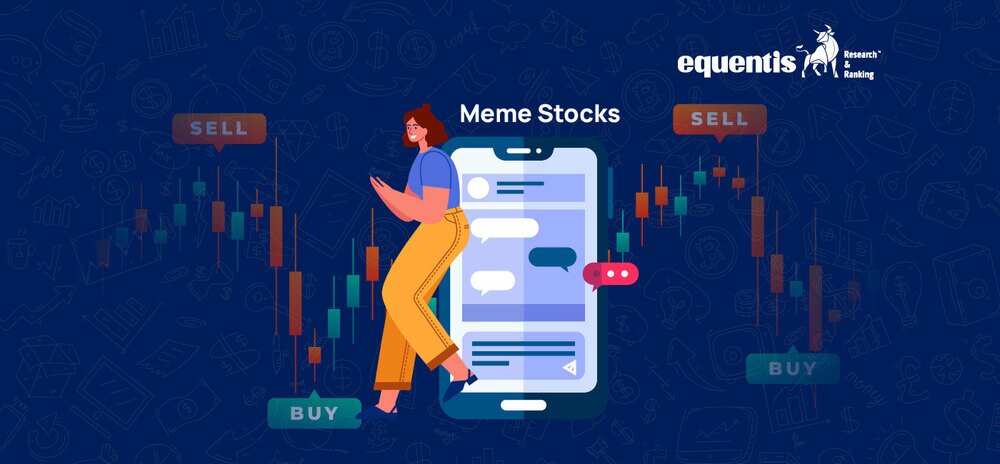Table of Contents
Envision this: You’re at a local coffee shop when you notice a crowd gathering around a humble coffee maker on display. Curious, you learn that a celebrity chef just praised this coffee maker in a viral video. Suddenly, the previously overlooked appliance is vanishing from the shelves, driven by a rush in enthusiasm and social media buzz.
Meme stocks operate similarly. Like a previously unnoticed coffeemaker, meme stocks are a company’s usual stock that suddenly garners immense attention and investment, not necessarily due to its fundamentals but because of online trends, viral posts, and internet hype.
What Is the Meaning of a Meme Stock?
A meme stock meaning a company stock that suddenly becomes very popular among retail investors because of new modes of communication, such as online and social media hype. A meme is usually amusing content that trends widely on the internet. In the same way, meme stocks go viral through online investing communities.
The value of these stocks is mainly driven by social media buzz and the collective actions of individual investors. Meme stock prices often go overboard and do not always reflect the company’s financial health or performance.
A step-by-step process of how a Meme Stock Works
Meme stocks work by joining the power of social media and online communities. The four-phase scenario of the meme stock looks like the following:
Early Adopter Phase:
In this phase, the stock is viewed as undervalued, attracting early investors who start buying it in large quantities. As more investors join in, the stock’s price begins to rise slowly, signaling the start of increased interest.
Middle Phase:
With increasing trading volumes, other investors notice the stock’s momentum and begin purchasing it. This collective buying activity causes the stock price to skyrocket, pushing it into the spotlight.
FOMO (Fear of Missing Out) Phase:
As word spreads online, especially on social media, retail investors experience FOMO. Many rush to buy the stock to avoid missing out on potential gains, which leads to a sudden and significant surge in the stock’s price.
Profit-taking Phase:
At this stage, early investors begin selling off their shares to lock in profits. Seeing this, other investors also start selling, fearing a potential drop in price. As more traders exit, the stock price begins to fall, marking the end of the rally.
The process takes very little time and can take a few hours or days.
Characteristics Of Meme Stocks
Meme stocks have some unique features that set them apart:
- Social Media Buzz: Meme stocks gain popularity through online platforms like Reddit, Twitter, and YouTube, where individual investors drive mass interest.
- High Volatility: Their prices can spike or drop dramatically quickly due to social media hype rather than company fundamentals.
- Retail Investor Dominance: Most trading is driven by retail rather than institutional investors, creating unpredictable price movements.
- Short Squeeze Potential: A short squeeze happens when many people bet a stock’s price will fall (short-selling). But if the stock price suddenly jumps instead, those short-sellers are forced to buy the stock quickly to avoid bigger losses. This rush to buy increases the price even more, which can create a snowball effect.
- Disconnect from Fundamentals: Their valuation often doesn’t align with traditional financial metrics, making them riskier investments.
- The Cultural Vibe of Meme Stocks: Meme stocks often resonate with younger investors through modern values like sustainability or nostalgia, forming strong emotional connections.
- Underdog Story: Meme stocks are seen as the little guys taking on Wall Street or Dalal Street. This thought resonates with many investors who support their struggle against the big players in finance.
Examples Of Meme Stock List
Companies have become famous (or infamous) as meme stocks. Here are some notable examples:
GameStop (GME):
GameStop Corp., an American gaming retailer, became the first meme stock after financial analyst Keith Gill posted a YouTube video predicting its share price could jump from $5 to $50. He pointed out that hedge funds had taken many short positions, and as the stock rose, they would need to cover these, pushing prices even higher.
On January 12, 2021, investor Ryan Cohen bought a 10% stake in GameStop and joined the board, raising the stock to $20. Later that month, Gill’s prediction came true as Reddit’s WallStreetBets community pushed the stock price from under $20 to nearly $500. Some saw this as a money-making opportunity, while others panic-bought, causing massive gains for retail investors and huge losses for hedge funds. This event popularized the term “meme stocks” among Reddit traders. After about a year, GameStop’s stock price returned to normal levels.
AMC Entertainment (AMC):
Another meme stock on the list is the movie theatre chain. In January 2021, AMC was close to bankruptcy with nearly $5 billion in debt due to the COVID-19 pandemic. The stock hit a low of $1.91. On January 25, AMC raised around $500 million in equity and refinanced $411 million in debt. This pushed the stock up to about $5. Between January 25 and 27, AMC became popular on Reddit’s WallStreetBets, triggering a short squeeze that saw its shares surge over 300%. This sharp rise was largely driven by social media buzz and investors who remained confident in the stock’s potential, even with closed theaters. AMC capitalized on the trend through share sales and raised over $1.2 billion by the second quarter of 2021.
BlackBerry (BB):
Renowned as a smartphone giant, BlackBerry became a meme stock favorite in 2021 when its price rose from $6.63 to $25 in January 2021. The company’s market share declined due to the rise of competitors like Apple and Samsung, and its stock price plummeted. However, a surge of interest from online communities and retail investors, driven by factors such as nostalgia and speculation, pushed the stock price up dramatically.
Nokia (NOK):
The Finnish telecom company experienced a price surge in early 2021 due to meme stock enthusiasm. In January 2021, an analyst’s bullish report on Nokia went viral on investing forums like Reddit. The report claimed Nokia was undervalued compared to its competitor Ericsson. Soon, investors on Reddit’s popular WallStreetBets forum started heavily promoting Nokia. As a result, Nokia’s stock surged by 38.5% in just one day. But this sudden rise didn’t last. Within days, the stock dropped by 29%, erasing much of the gains.
- Bed Bath & Beyond (BBBY): The home goods retailer became a meme stock in the second half of 2022, seeing wild price swings. The stock rose 25% in a single day on 17th August 2022, nearly five times in the last two weeks. The price surge was driven by strong retail investor activity on platforms like Reddit.
- Simran Farms: An Indore based small-sized poultry product manufacturer experienced the mem stock phenomenon when a renowned stock market investor bought 1.1% stake in the company in December 2021. The news grabbed attention of many retail investors and the company went viral. As a result, the company shares were driven to a rise of 44%.
In India, stocks such as IRCTC and ITC have unveiled meme stock behaviors, with social media buzz occasionally powering significant price movements. With the growth of social media buzz, HNI investment further amplifies price movements, often creating a snowballing market demand and driving higher prices.
Risks Associated with Investing In Meme Stocks
Meme stocks usually gain popularity through influencers or online communities. For example, RoaringKitty played a key role in the GameStop (GME) surge, while WallStreetBets is a popular community driving stock movements. Relying too heavily on such advice can be risky. The risks of meme stocks include the following:
- High volatility: Meme stock prices are very unstable as they can crash in no time as they rise, leading to great losses. Given the volatile nature of meme stocks, consulting a share market advisory can help investors make comprehensive financial decisions and avoid impulsive trades.
- Overvaluation: Online hype around meme marketing is traded at much higher prices than what traditional analysis considers fair.
- Market manipulation: These stocks can be targets for pump-and-dump schemes.
- Weak fundamentals: Meme stocks often lack solid financial backing.
- Liquidity issues: It might be hard to buy or sell in large quantities.
- Regulatory scrutiny: They may face tighter regulations.
- Short-term focus: It’s easy to lose sight of long-term investment goals
- Emotional decision-making: Meme stock mania can lead to reckless, poorly thought-out investments driven by hype.
- Timing difficulties: The time of entry and exit is very difficult to gauge in such unstable stocks.
- Regulatory risks: Hidden new regulations might disturb meme stock trading. Always invest only what you can afford to lose, especially with high-risk investments like meme stocks.
Conclusion
Meme stocks are a new and different force in the financial markets, and social media influence usually drives small-scale investors. They are extremely volatile and carry inherent risks. So, investors who are interested in meme stocks may be very careful and learn about the investment, as they are very speculative.
Investors could be advised by experts at trusted financial firms and seek suggestions on how to invest in meme stocks. It may be wise to consult experienced professionals to mitigate the high-risk investments in meme stocks.
*Disclaimer Note: The securities quoted, if any, are for illustration only and are not recommendatory. This article is for education purposes only and shall not be considered as recommendation or investment advice by Research & Ranking. We will not be liable for any losses that may occur. Investment in securities market are subject to market risks. Read all the related documents carefully before investing. Registration granted by SEBI, membership of BASL, and certification from NISM in no way guarantee the performance of the intermediary or provide any assurance of returns to investors.
FAQ
What are the top meme stocks?
Here are some top meme stocks:
AMC Entertainment
GameStop
BlackBerry
S&P 500
Nvidia
Tesla
Carvana
Super Micro Computer
PayPal
Intel
Is Tesla a meme stock?Tesla is not considered a meme stock in a true sense the same way as stocks like GameStop or AMC. But, it has some traits of a meme stock, such as a fervent online fanbase, extreme price instability, and frequent social media discussions. Despite this, Tesla’s valuation is also sponsored by its strong brand, innovation, and leadership in the electric vehicle market, making it more than just a meme-driven investment.
Is meme stock a good investment?Investing in meme stock can be very risky. Some Reddit traders were able to make a lot of money in a short amount of time by buying and then selling AMC and/or GameStop at the exact right moment.
How useful was this post?
Click on a star to rate it!
Average rating 1 / 5. Vote count: 1
No votes so far! Be the first to rate this post.
I’m Archana R. Chettiar, an experienced content creator with
an affinity for writing on personal finance and other financial content. I
love to write on equity investing, retirement, managing money, and more.
























